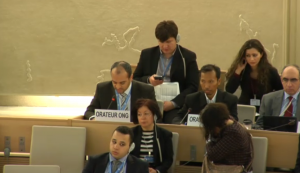On March 9, 2016, at the 31st session of the Human Rights Council, Ali Aldubaisi delivered an oral intervention on behalf of ADHRB and the European-Saudi Organization for Human Rights during the Item 3 Interactive Dialogue with the Special Rapporteur on Summary Executions, in which he raised the issue of executions, particularly the executions of minors in Saudi Arabia.
Please continue reading for his full remarks, or click here for a PDF of his statement.
Mr. Special Rapporteur,
Americans for Democracy & Human Rights in Bahrain and the European-Saudi Organization for Human Rights would like to express their concern regarding the deterioration of freedom of expression and peaceful assembly, and the increasing number of executions.
Mohammed Wad’ani is currently serving 5 years from a total of 15 because of his participation in peaceful protests. Additionally, it has been almost 8 years now since the imprisonment of Khaled al-Omair because of his call to support Palestinians in Gaza.
On 2 January, 2016, Saudi Arabia executed 47 prisoners, including Sheikh Nimr al-Nimr in addition to four minors: Mustafa Abkar, protestor Ali Al Rabeh – Amin al-Ghamdi – Meshaal Al Faraj, protestor protester Mohammed Al-Shoyoukh, and Mohammed Alsoyimel whose family was informed by the prison administration that he was not found to have committed a serious crime. Others were executed after being accused of unserious crimes. Trials were unfair.
The day following the executions, the High Commissioner issued a statement in which he expressed his deep regret about the executions in Saudi Arabia, the execution of Sheikh Al-Nimer and that of every person who did not commit a legal offense under international human rights law. The High Commissioner recalled his letter to the king on 14 May, 2015, in which he asked him to halt the execution. The international solidarity before and after the execution indicate the rightness of this case.
We thank the Special Rapporteur for sending 15 letters to Saudi Arabia throughout the last four sessions, five of which were on the issue of Sheikh Nimr.
Yet, Saudi Arabia’s response included incorrect claims that were not proven by the judiciary. Our information indicate the unfair nature of the trial in contrary to Saudi Arabia’s claims.
55 prisoners risk being executed, including 12 minors, and 25 accused of spying for Iran. The trial, which started a few days ago, has little to do with the principles of fair trials. The media, which is controlled by the government, accused them even before their trial began. Campaigns continue to escalate in what appears to be a prelude to execution.
A judge recently told the press that tweeting could lead to execution. In addition, the existence of torture and the fact that judges did not look into the complaints submitted by those who were tortured, especially prisoners of the General Intelligence, is extremely troubling, especially after considering the judge’s statement asking that the detainee be tortured.
We ask the Special Rapporteur on summary executions to renew his 2005 request to visit Saudi Arabia and to demand that Saudi Arabia stop the executions.
After that Saudi Arabia has executed 47, based on Article 8, is it convenient to ask the presidency of the Council, to suspend the membership of any member who commits gross and systematic violations? And according to paragraph d of the Human Rights Council resolution 3/8 to the Special Rapporteur on summary executions: wasn’t he asked to take more effective measures to combat this issue? I ask this question knowing that 55 risk being executed.
Also does the Special Rapporteur on peaceful assembly think of the continuing criminalization of peaceful demonstrations in Saudi Arabia?
Thank you Mr. Special Rapporteur.





